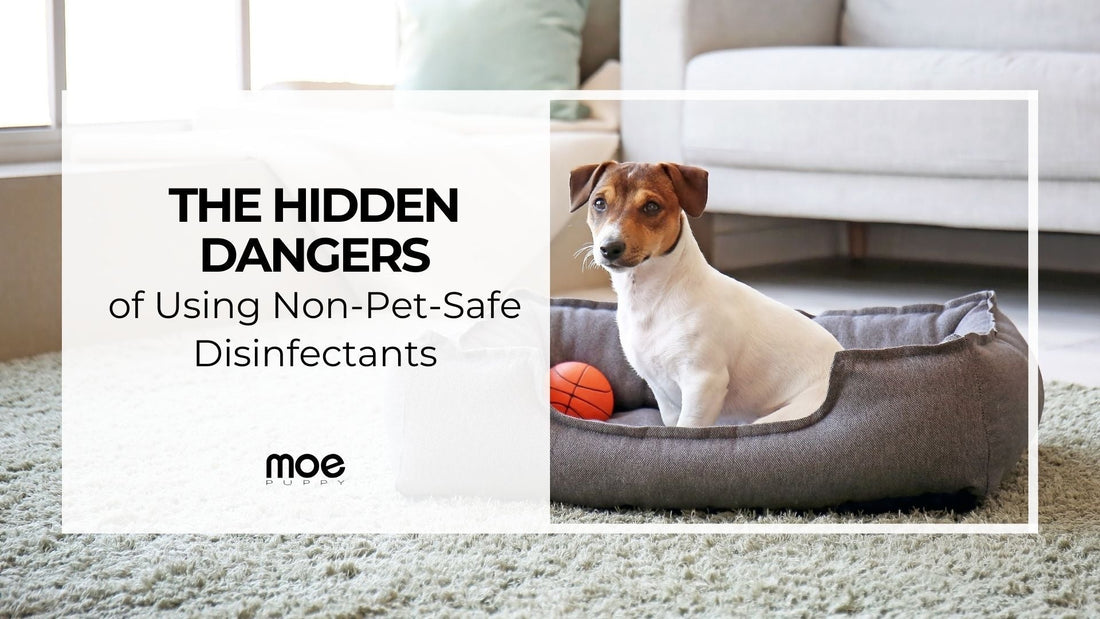
The Hidden Dangers of Using Non-Pet-Safe Disinfectants
Share
Keeping your home clean and germ-free is essential, especially if you have pets. However, many pet parents unknowingly use disinfectants that can pose serious health risks to their furry friends. While these cleaning agents effectively kill germs and bacteria, they often contain toxic chemicals that can harm pets when ingested, inhaled, or absorbed through their paws. In this article, we’ll explore the hidden dangers of using non-pet-safe disinfectants and why switching to a pet-safe disinfectant is a crucial step in ensuring your pet’s safety.

Common Toxic Ingredients in Household Disinfectants
Many conventional cleaning products contain ingredients that can be extremely harmful to pets. Here are some of the most common toxic chemicals found in non-pet-safe disinfectants:
1. Phenols
Phenols are commonly found in disinfectants labeled as antibacterial, antiseptic, or antimicrobial. These chemicals can be particularly toxic to cats and dogs, leading to liver damage, respiratory issues, and even death in severe cases.
2. Bleach (Sodium Hypochlorite)
Bleach is a strong disinfectant, but it can cause severe irritation to a pet’s skin, eyes, and respiratory system. If ingested, bleach can result in vomiting, drooling, and digestive distress.
3. Ammonia
Ammonia is often found in window cleaners, floor cleaners, and degreasers. The fumes alone can cause respiratory distress in pets, and accidental ingestion can lead to poisoning and severe gastrointestinal distress.
4. Quaternary Ammonium Compounds (Quats)
Quats are found in many disinfecting wipes and sprays. They are known to cause skin irritation, respiratory problems, and, in some cases, chemical burns if a pet comes into direct contact with them.
5. Alcohol
Many disinfectants contain isopropyl alcohol, which can be toxic to pets if ingested or absorbed through the skin. Symptoms of alcohol poisoning in pets include vomiting, weakness, and difficulty breathing.
How Non-Pet-Safe Disinfectants Affect Pets
Pets are naturally curious and often come into contact with cleaning surfaces by licking floors, sniffing countertops, or rubbing against freshly cleaned furniture. Non-pet-safe disinfectants can harm them in several ways:
1. Respiratory Issues
Many household cleaners release strong fumes that can irritate your pet’s respiratory system. Cats, in particular, are sensitive to airborne chemicals, which can lead to coughing, sneezing, and difficulty breathing.
2. Skin and Paw Irritation
When pets walk on freshly cleaned floors or surfaces treated with toxic disinfectants, the chemicals can absorb into their skin or get stuck between their paws, causing irritation, burns, or allergic reactions.
3. Gastrointestinal Distress
If a pet licks a surface treated with non-pet-safe disinfectants, it can ingest harmful chemicals that may lead to vomiting, diarrhea, drooling, and abdominal pain.
4. Long-Term Health Effects
Repeated exposure to toxic cleaning agents can lead to chronic health conditions, such as liver and kidney damage, weakened immune systems, and neurological issues.

The Importance of Using a Pet-Safe Disinfectant
Switching to a pet-safe disinfectant is the best way to ensure your home stays clean without putting your furry friend at risk. Here’s why pet-safe disinfectants are a better choice:
1. Non-Toxic and Safe for Pets
Pet-safe disinfectants are formulated with natural, non-toxic ingredients that effectively eliminate germs while being gentle on your pet’s skin, paws, and respiratory system.
2. Eliminates Harmful Germs and Bacteria
A high-quality pet-safe disinfectant can effectively kill bacteria, viruses, and fungi without using harsh chemicals.
3. Eco-Friendly and Biodegradable
Many pet-safe cleaning products are made with environmentally friendly ingredients that break down naturally, reducing pollution and making them safe for both pets and humans.
4. Pleasant, Natural Scents
Unlike chemical disinfectants that have strong, irritating odors, pet-safe disinfectants often use essential oils like lavender, eucalyptus, or citrus for a refreshing and natural scent.
The Best Pet-Safe Disinfectant for Your Home
For pet parents looking for a trusted and effective pet-safe disinfectant, the Moe Puppy Multi-Action Disinfectant is an excellent choice. This disinfectant is specially formulated to be safe for pets while providing powerful germ-fighting action. It helps eliminate harmful bacteria and viruses while ensuring that your pet is not exposed to toxic chemicals.
By choosing a safe and reliable disinfectant, you can keep your home clean and fresh while ensuring the health and well-being of your beloved pets.
Final Thoughts
Your pet’s health and safety should always be a top priority, and using a pet-safe disinfectant is a simple but crucial step in creating a pet-friendly home environment. By avoiding harmful chemicals and opting for natural cleaning solutions, you can keep your home clean without compromising your pet’s well-being.
Make the switch today and give your furry friend a healthier, toxin-free space to thrive!


